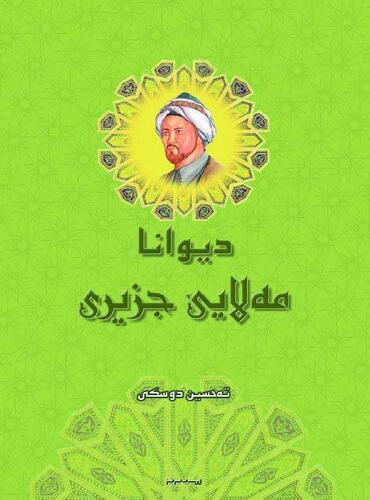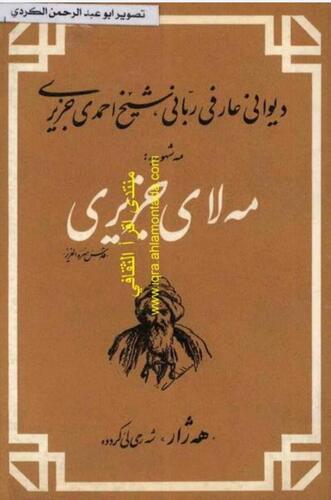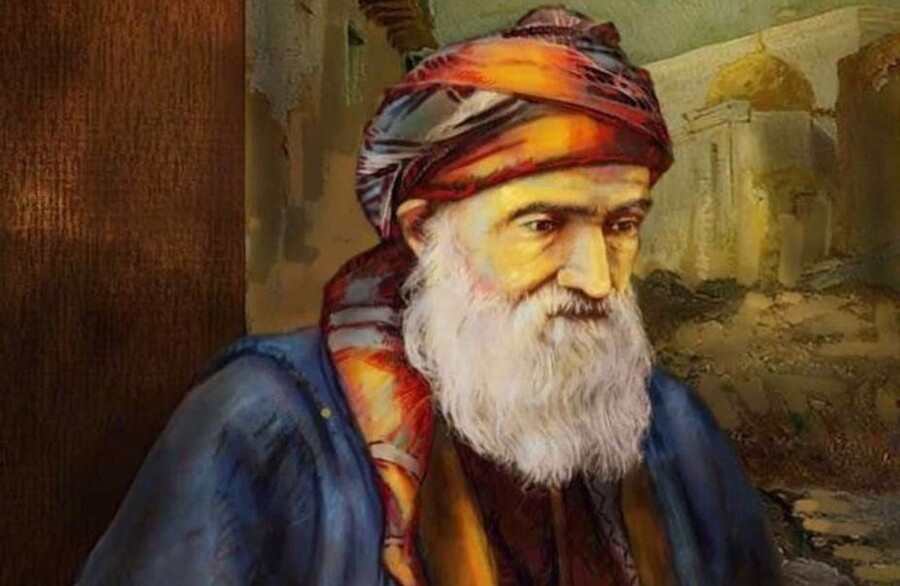Dr. Azad Mukri
Mullah Jaziri and Raising Hands towards the Heaven
Mystical and meaning-searching literature has a long history in the Middle East, especially among the Arabs, Persians, and Kurds. The subject of the poet in such literary styles is an existence/ entity that cannot be described in any particular framework, but only an imagination of this prominent, great, pure, perfect entity/ subject can form in the poet's mind.
Generally, this subject that the poets talk to romantically and reveal their secrets to that being has greater authority than ordinary human beings. This being is the poet's happiness and also the reason for all his disappointments at the same time.
Who is this special being that the poet does not get tired of talking to and describing?
Neither the poets themselves nor any reader or critics know. That is, this being is not one particular person and they are everybody, too. This being is the source of every kind of beauty and pureness. As Plato says, this being is the great creative entity. However, perhaps this is not the subject. As long as we know, this being is the reason for every speech, happiness, and suffering that is not on Earth. It is not reasonable for such a person/non-person being to be from the same place where the poet is. This powerful being is the inspiration for most of the poets and such a form of love is known as mystical love.

Mystical literature among Kurds has a long history. This style of literature began with the great Kurdish poet, Mullah Jaziri, works. We can see beyond the mystical love and passionate views of supernatural phenomena in Mullah Jaziri's Ghazals and Odes. Mullah Jaziri's poems not only have a strong structure but also can be compared to the poems of the most prominent poets of this region in their content and meaning. For example, his Ghazals are as strong as Hafez Shirazi's, and as he mentioned he liked Hafez's poetic language and thinking. However, the way of expressing love in Mullah Jaziri's poems is totally different from other Kurdish or Persian poems' forms of expression. The love that is expressed in his poems needs literature professionals and experts to analyze it so that they can determine the subject of such love. It means, determining Jaziri's love geography might be very difficult. His poems and odes do not as such to carry any kind of slogan mystically, but they contain many symbolic signs that the reader can interpret to understand Mullah Jaziri's intentions. Is the love that he has chosen or the way he has taken a human love or a heavenly one? That is, Mullah Jaziri's poems are somewhere between these two fields and the reader can understand Jaziri's thinking background by finding these symbols and signs within the words and philosophical and mystical meanings he has applied in his poems. Are his poems mystical and communicating with the heavens or are they earthly ones communicating with a person?
Determining this difference for the average poet is easy because such poets cannot write complex works. They also cannot hide their meaning from the reader but they rather convey their meanings as if they are expressing a slogan, thus the reader understands the poet's meanings fields. The professional and aesthetic poet, however, does not reveal his text so easily. The meaning and content of their intention can be understood in a difficult way since it is hidden within many symbols and signs. Thus, only precise and smart readers can analyze the text so that they can put the elements of meaning together once again to discover their true meaning.
We can find both of the meanings; the ones that imply the heavenly meanings and those that convey earthly intentions in Mullah Jaziri's works.

As it is mentioned, unlike the simple forms of poems the poet reveals their intention easily, Mullah Jaziri did not do that. For instance, all those poems that were written to praise the prophet Mohammad are easily understood by the reader because the poet has revealed his intention from the very beginning so that the poem would be easily understood. However, in Mullah Jaziri's texts, it is not that simple.
That is, even in those poems that are traditionally written to praise the prophet or even God, Mullah Jaziri has tried to use some words and phrases that symbolically convey a person's position and we can find his intention through thinking about these words. For example, in his ode called "Love Elixir," Jaziri is talking about the prophet but he does not attempt to mention those characteristics that should be mentioned for the Prophet as a holy character directly. However, he uses a symbolic atmosphere by using the mystical pleads. That is applying all those symbols that show a holy character. He applies some symbols that are among the religious symbols. For example, fidam, Lawhi Mahfouz, holy spirits, Qadr night, …
Here, there is a special harmony among the words such as holy, Qadr night, light, and Haraam, … the link between these words must be found so that the text can be unveiled. He talks about a person who is the center of a holy world. There are Qadr night, Haraam, and many other such things in this holy world. All of these are a group of symbolic words that are applied by Mullah Jaziri so that he could get away from the direct, normal, and cliché form of praising.
In the last verse of this ode, he says:
I praise the God who gave his servant Mullah
The elixir of a suffering love, not Dinar or Derham
This "elixir of suffering love" he is mentioning is not something one can find because elixir is not something one can have. The heavenly love is a far-reaching love. Mullah Jaziri has tried to consider this kind of relationship in his other odes. He has chosen a form of love that is among the supernatural loves.
However, Mullah Jaziri does not simply stay in this field. He has mentioned heavenly and earthly love in his poems. The most important evidence for this claim is his long and uncommon ode praising a special person.









